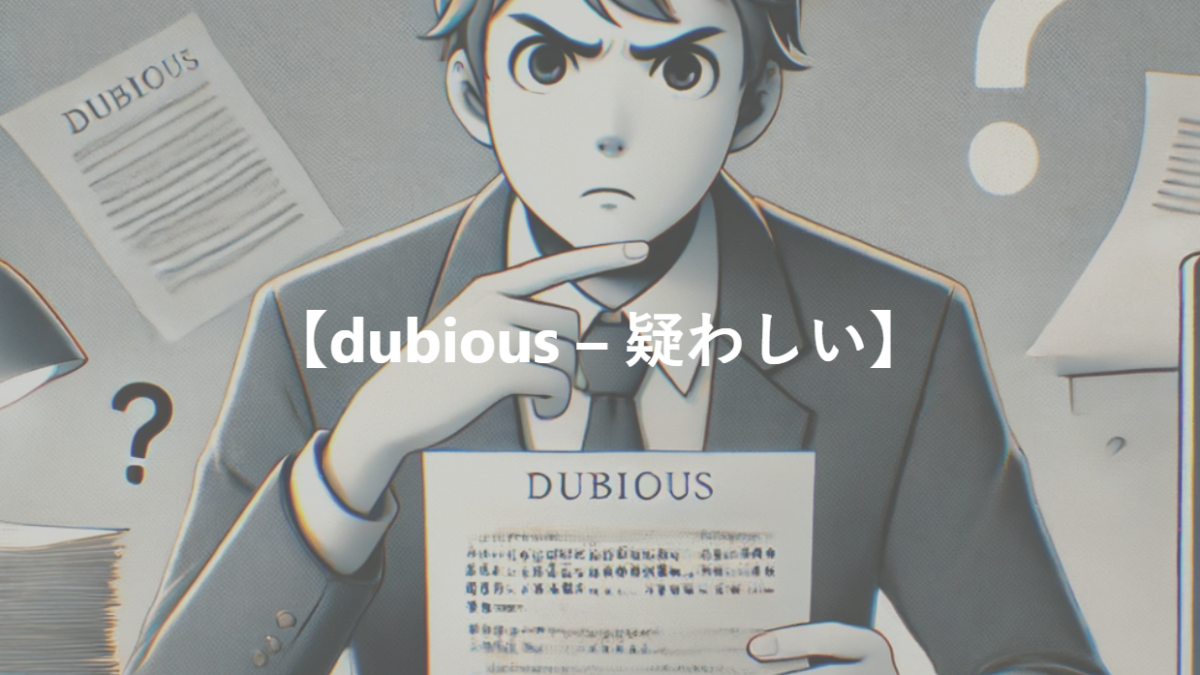語源・類義語・反対語・例文
【Dubious – 疑わしい】という単語の語源とか由来を知っていますか?
「Dubious」は、「疑わしい」や「不確かな」という意味を持ちますが、その語源はラテン語の「dubiosus」から来ており、「疑う」を意味する動詞「dubare」に由来します。これはさらに、選択や判断において二つに分かれることを意味する「duo」(二)という単語にさかのぼります。つまり、「dubious」の語源は、文字通り「二つに分かれる」や「決断できない」状態を指し、そこから「疑わしい」や「確信が持てない」という意味が生まれました。この単語は、事実、意見、品質などについて確信が持てない時や、真実かどうか疑問を抱いている状況に使われます。
The word “dubious” means “questionable” or “uncertain,” and its origin comes from the Latin word “dubiosus,” which derives from the verb “dubare,” meaning “to doubt.” This can be traced back even further to the word “duo,” meaning “two,” signifying a state of being divided in decision or choice. Therefore, the etymology of “dubious” literally points to a condition of being “split in two” or “indecisive,” from which the meanings “questionable” or “lacking conviction” emerged. This word is used when there is a lack of confidence in facts, opinions, quality, etc., or when there is doubt about the truthfulness of something.
この単語の類義語・反対語を教えてください。
類義語
- Skeptical: 疑い深い、懐疑的な。ある事柄に対して確信が持てない態度を示します。
- Uncertain: 不確かな、確信が持てない。将来の出来事や結果について確信がない状態を指します。
- Questionable: 疑問を投げかけられる、疑わしい。信頼性や正当性が疑われることを示します。
- Suspect: 疑わしい、怪しい。何かが正しくないか、問題があると疑う状態を意味します。
反対語
- Certain: 確かな、確信している。疑いの余地がなく、信じて疑わない状態を指します。
- Undoubted: 疑いの余地がない、確実な。全く疑われることがないことを意味します。
- Convincing: 説得力がある、納得させる。他人を信じさせるか、何かが真実であると確信させる能力を持つことを示します。
- Reliable: 信頼できる、確実な。何かが正確であり、依存できることを意味します。
この単語に似た単語で間違いやすい単語はありますか?
- Dubitable: 「Dubious」と非常に似ており、疑わしいや疑問に思われるという意味を持ちます。しかし、一般的な使用頻度は「Dubious」の方が高く、「Dubitable」はやや古風な表現と見なされることがあります。
- Doubtful: これも「疑わしい」や「確信が持てない」という意味で「Dubious」と似ていますが、「Doubtful」は主に未来の出来事や成果に対する不確実性を強調するのに対し、「Dubious」は提供された情報や状況の信頼性に疑問を投げかける際によく使われます。
- Suspicious: 「怪しい」や「不審な」という意味で、何かが正しくないか、不正があると疑う時に使用されます。「Dubious」と「Suspicious」は両方とも疑いを表現しますが、「Suspicious」は特に悪意や詐欺を疑う場合に使われることが多いです。
この単語を使った例文を5つほど教えてください。
The politician’s promises seemed dubious and were met with skepticism from the public.
(その政治家の約束は疑わしく、一般の人々からは懐疑的な目で見られました。)
The company’s financial statements raised dubious questions about its financial health.
(その企業の財務諸表は財務状態について疑問を投げかけました。)
The witness gave a dubious testimony that contradicted the evidence presented in court.
(その証人は法廷で提示された証拠と矛盾する疑わしい証言をしました。)
The online reviews for the product were mixed, with some praising its performance while others expressed dubious quality.
(その商品のオンラインのレビューは賛否両論であり、性能を称賛するものもあれば、品質に疑いを示すものもありました。)
The scientist conducted further research to address the dubious findings of the initial study.
(科学者は初期の研究の疑わしい結果に対処するために、さらなる研究を行いました。)
【dubious – 疑わしい】のコロケーション
- Dubious honor (疑わしい栄誉): 本当に名誉と呼べるか疑わしい、または望ましくない「栄誉」を指します。皮肉的な状況や二重の意味を含む表現です。
- Dubious distinction (疑わしい区別): 他と区別されることが名誉ではない、または疑問を投げかけられるような状況を表します。
- Dubious reputation (疑わしい評判): 信頼性や正当性が疑われる評判や名声を意味します。この評判は、その人や組織が信頼できない、または問題があると見なされることを示しています。
- Dubious claim (疑わしい主張): 真実性や根拠が疑わしい主張を指します。このような主張は、しばしば検証や証拠が必要とされます。
- Dubious quality (疑わしい品質): 製品やサービスの品質が信頼できない、または期待を満たしていないことを表します。消費者にとって不満や不信感を引き起こす可能性があります。
「dubious」という言葉は、不確かな、信頼できない、または何らかの疑問を持つ状況を表現するのにしばしば使われます。
例えば、「Dubious honor」は、名誉と呼ぶには疑問が残るような、または望ましくない栄誉を指します。この表現には、皮肉や二重の意味が含まれることがあります。
「Dubious distinction」は、他と区別されることが必ずしも名誉なことではない、疑問を投げかけられるような区別を表します。ここでの区別は、時には望ましくない注目や評価を意味することがあります。
「Dubious reputation」は、その人や組織が信頼できない、または問題を抱えていると見なされることから生じる、疑わしい評判や名声を意味します。このような評判は、しばしばその人物や組織に対する信頼の欠如を反映しています。
さらに、「Dubious claim」は、その真実性や根拠が疑わしい主張を指します。このような主張は、しばしば検証や追加の証拠を必要とします。
そして、「Dubious quality」は、製品やサービスの品質が期待を満たしていない、または信頼できないことを指し、消費者に不満や不信感を引き起こす可能性があります。
The word “dubious” is often used to express situations that are uncertain, untrustworthy, or in some way questionable.
For example, “Dubious honor” refers to an honor that is questionable or undesirable. This expression can include irony or a double meaning.
“Dubious distinction” represents a distinction that is not necessarily honorable and raises questions. Such a distinction can sometimes mean unwanted attention or evaluation.
“Dubious reputation” means a questionable reputation or fame that arises from being considered untrustworthy or problematic. This kind of reputation often reflects a lack of trust in the person or organization.
Furthermore, “Dubious claim” points to a claim whose truthfulness or basis is doubtful. Such claims often require verification or additional evidence.
Lastly, “Dubious quality” indicates that the quality of a product or service is not meeting expectations or is unreliable, potentially causing dissatisfaction or mistrust among consumers.
dubiousを使った文法問題5選
- 品詞問題: 次の文中のdubiousの品詞はどれですか?
The man’s story about winning the lottery seemed dubious.
- (a) 名詞
- (b) 動詞
- (c) 形容詞
- (d) 副詞
解答: (c) 形容詞
解説: dubiousは「疑わしい」という意味の形容詞で、この文ではstoryを修飾しています。
- 類義語問題: 次の単語の中でdubiousの類義語として最も適切なものはどれですか?
- (a) doubtful
- (b) suspicious
- (c) questionable
- (d) uncertain
解答: (a) doubtful, (b) suspicious, (c) questionable
解説: これらの単語は全て「疑わしい」というニュアンスを含んでおり、dubiousの類義語として適切です。uncertainは「不確かな」という意味で、少しニュアンスが異なります。
- 反意語問題: 次の単語の中でdubiousの反意語として最も適切なものはどれですか?
- (a) certain
- (b) reliable
- (c) trustworthy
- (d) credible
解答: (a) certain, (d) credible
解説: certainは「確かな」、credibleは「信頼できる」という意味で、dubiousの反意語として適切です。reliableとtrustworthyも近い意味ですが、少しニュアンスが異なります。
- 語法問題: 次の( )に入る適切な前置詞はどれですか?
The police were dubious ( ) the suspect’s alibi.
- (a) of
- (b) about
- (c) for
- (d) with
解答: (a) of, (b) about
解説: dubiousは「of」または「about」を伴って、「〜について疑わしい」という意味になります。
- 文脈理解問題: 次の文脈においてdubiousが意味するものはどれですか?
The company’s financial records were dubious, raising concerns about their accounting practices.
- (a) 不完全な
- (b) 不正確な
- (c) 不透明な
- (d) 不正な
解答: (c) 不透明な, (d) 不正な
解説: この文脈では、dubiousは「いかがわしい」「怪しい」というネガティブな意味合いで使われています。したがって、「不透明な」または「不正な」が最も適切な意味です。

